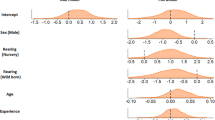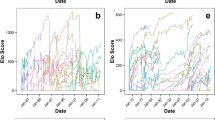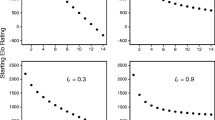Abstract
Seventeen male crab-eating macaques drawn from two captive troops, were tested on a brightness discrimination, reversal learning task. Fourteen of these animals completed ten reversals. It was found that the performance of the three highest ranking animals from each troop, taken together, was poorer than that of the lower ranking animals that were tested. The high ranking animals made more errors before reaching criterion on both initial learning and the reversal problems. Analysis of error patterns revealed that, while the high ranking animals had no more difficulty than the others in withholding their responses to the previously correct stimulus following reversals, they did not adopt the correct strategy as soon as the low ranking animals. The results have been interpreted in terms of a carry-over of a hypothetical factor or factors resulting from pressures created by the ongoing social dynamics involved in establishing and maintaining a given social rank at the time laboratory testing occurred.
Similar content being viewed by others
References
Amsel, A., 1958. The role of frustrative nonreward in noncontinuous reward situations.Psychol. Bull., 55: 102–119.
Angst, W., 1975. Basic data and concepts on the social organization ofMacaca fascicularis. In:Primate Behavior,L. A. Rosenblum (ed.), Academic Press, New York, pp. 325–388.
Bernstein, I. S., 1971. Activity profiles of primate groups. In:Behavior of Nonhuman Primates, Vol. 3,L. A. Rosenblum (ed.), Academic Press, New York, pp. 69–106.
Bunnell, B. N., D. P. Kenshalo, Jr., J. D. Allen, F. J. Manning, &F. J. Sodetz, 1979. Performance correlates of social behavior and organization: Social rank and omission of reinforcement in rhesus monkeys (M. mulatta).Primates, 20: 77–86.
————, ————,P. Czerny, &J. D. Allen, 1979. Performance correlates of social behavior and organization: Effects of group formation on operant performance in rhesus monkeys (M. mulatta).Primates, 20: 197–210.
Costanzo, D. J., G. R. Rudolph, &W. Cox, 1972. Social status and learning in crayfish.J. Biol. Psychol., 14: 30–32.
————,P. G. Henke, &D. R. Bosley, 1975. Reversal of visual discrimination problem and differential frustration effects in dominant and submissive rats.Anim. Learn. Behav., 3: 49–52.
Denenberg, V. H. &R. W. Bell, 1959. Relationships between social reactions and avoidance conditioning.Physiol. Zool., 32: 51–56.
Hudgens, G. A. &D. A. MacNeil, 1970. Aggressiveness and learning ability: Effect of histories of wins or defeats on avoidance learning in mice.Psychonomic Sci., 20: 51–53.
Levine, M., 1965. Hypothesis behavior. In:Behavior of Nonhuman Primates, Vol. 1,A. M. Schrier,H. F. Harlow, &F. Stollnitz (eds.), Academic Press, New York, pp. 97–127.
Levine, M. D. &T. P. Gordon, 1968. Emotional response of rhesus monkeys to chronic psychological stress.Proceed. Army Sci. Conf., 2: 17–25.
Strayer, F. F., 1976. Learning and imitation as a function of social status in macaque monkeys (Macaca nemestrina).Anim. Behav., 24: 835–848.
Author information
Authors and Affiliations
Additional information
Supported by USAMRDC Contract No. DADA 17-73-C-3007.
About this article
Cite this article
Bunnell, B.N., Gore, W.T. & Perkins, M.N. Performance correlates of social behavior and organization: Social rank and reversal learning in crab-eating macaques (M. fascicularis). Primates 21, 376–388 (1980). https://doi.org/10.1007/BF02390467
Received:
Accepted:
Issue Date:
DOI: https://doi.org/10.1007/BF02390467




